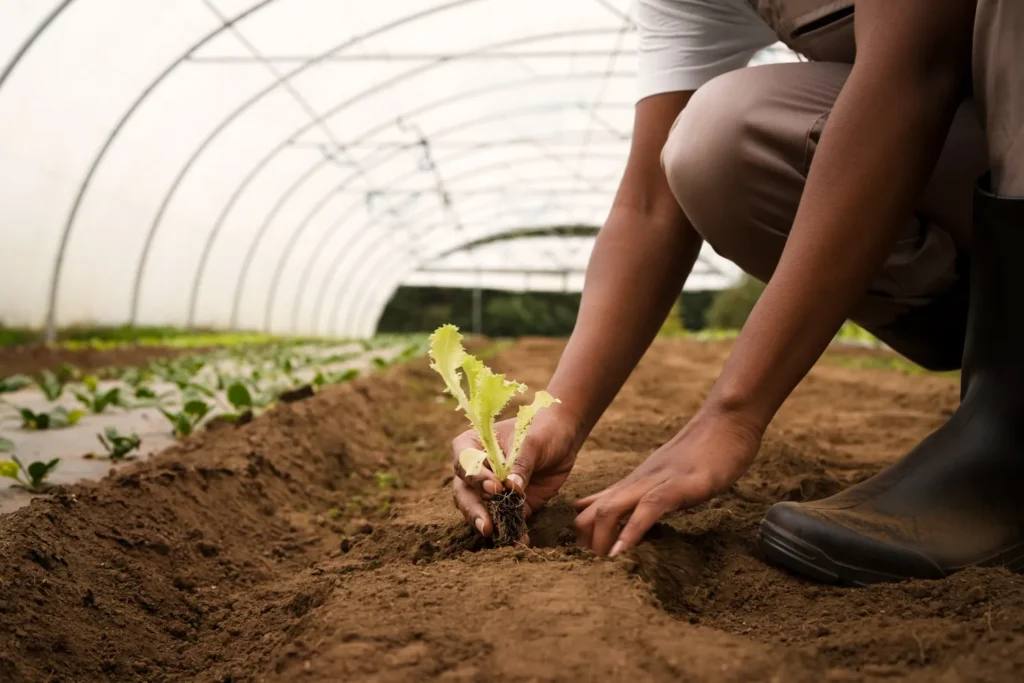Sustainable farming practices not only protect the environment – they can also lead to higher or more stable yields over time. By caring for soil health, conserving resources, and working with natural ecosystems, farmers often find their crops grow more robustly. In fact, long-term studies have found that organic and sustainable farms can match the yields of conventional farms for major crops like corn and soy, while using fewer synthetic inputs
. This means you don’t have to sacrifice productivity to farm in an eco-friendly way.
Key sustainable practices that boost yields include maintaining soil fertility, diversifying crops, and controlling pests naturally. Crop rotation is a foundational practice: by rotating different crops (for example, planting nitrogen-fixing legumes like beans after a heavy feeder like maize), farmers can naturally replenish soil nutrients and break pest/disease cycles. Healthy soil grows healthier plants, which are more productive. Using organic fertilizers and compost helps build that soil fertility, leading to stronger plant growth and better yields. Integrated Pest Management (IPM) – using beneficial insects, biological controls, and smart crop rotations – keeps pest damage low without relying solely on chemicals, so crops can flourish. Additionally, conserving soil moisture through methods like mulching or reduced tillage ensures that plants have water when they need it, which can significantly improve yield consistency.
Studies also show tangible yield gains from sustainable methods. For example, a long-term trial in China found that incorporating organic fertilizer into a conventional system increased wheat yields by up to 40% compared to using chemical fertilizer alone
. The boost came from improved soil structure and nutrient availability. Similarly, practices like agroforestry (integrating trees or shrubs with crops), cover cropping, and precision water management can all enhance productivity per hectare by improving the growing conditions for crops.
Examples of sustainable farming practices for higher yields:
- Crop Rotation: Alternating the types of crops grown in each field season to season. This helps balance nutrient use and disrupt pest life cycles. For instance, planting a legume crop after a cereal can naturally add nitrogen to the soil, reducing the need for synthetic fertilizer and often increasing the next crop’s yield.
- Use of Organic Fertilizers and Compost: Returning organic matter to the soil through manure, compost, or bio-fertilizers (like Ecoagristyle’s ECOAGRI-1 and OMB-2) keeps soils fertile. Rich, biologically active soil grows more vigorous plants, which can lead to better yields and crop quality.
- Integrated Pest Management (IPM): Combining biological pest control, crop rotation, and careful monitoring to minimize pest damage. Healthier plants and natural predators (like ladybugs controlling aphids) mean fewer crops lost to insects or diseases, ultimately boosting the harvest.
- Conservation Tillage: Reducing plowing and tilling to maintain soil structure and organic matter. No-till or low-till farming prevents erosion and moisture loss. Over time, soils under conservation tillage become more fertile and capable of supporting high yields, even under erratic weather.
- Agroforestry and Cover Crops: Planting trees alongside crops or using cover crops during the off-season improves yield indirectly by enhancing soil and microclimate. Trees can provide shade and wind protection, while cover crops (like clover or beans grown between main crops) add nutrients and prevent weeds. These practices increase overall farm productivity and stability of yields.
By adopting these practices, farmers build a more resilient farming system. You may notice your yields becoming more consistent year to year, with fewer extreme highs and lows. Moreover, the cost savings on chemical inputs and the long-term improvements in soil make your farm more profitable over time
file-8evft8vy5eedxcytvzepim
. Sustainable farming is about working smarter: using nature’s own mechanisms to enhance crop production. Even starting with one or two practices – like rotating crops or using an organic fertilizer – can set you on the path to higher, sustainable yields. Ecoagristyle is here to support farmers in this journey, with proven organic inputs and expert guidance to help you farm sustainably without sacrificing productivity.

